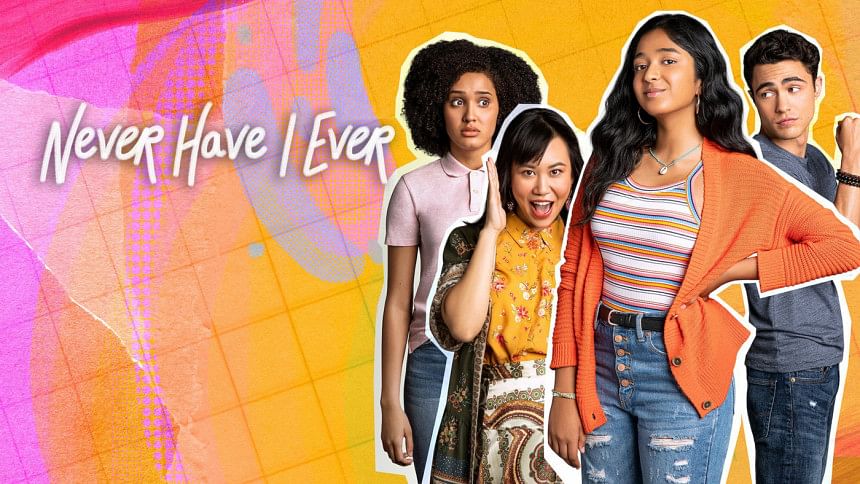Never have I ever…seen such diverse casting in western media

Discovering Netflix's Never Have I Ever (created by Mindy Kaling and Lang Fisher) was one of my only highlights from 2020 (shudders).
The protagonist is an angsty, American Indian teenager, Devi Vishwakumar (Maitreyi Ramakrishnan). She lives with her dermatologist mother, Nalini (Poorna Jagannathan) and her cousin, Kamala (Richa Moorjani). Throughout the series, the three women of Tamil heritage are seen trying to navigate their relationship with American culture. As someone who studied English literature with a focus on postcolonial studies for six years, I cannot help but overanalyze the strong diasporic plot lines in the series. Without the show's comedic lens, their stories could easily be out of a Jhumpa Lahiri novel. Something I have in common with the actress Jagannathan, is that we are both daughters of diplomats. My own multicultural experiences may be why I am particularly intrigued by this show. Without my resonation to the characters of colour, I would probably not be a fan of this teen-drama.
Nalini with her husband, Mohan had immigrated to America to pursue the American Dream (that too in 2001…). Kamala, despite being a PhD candidate at Caltech, struggles to assert her desire for independence and escape the societal pressures for an arranged marriage. Devi, as a second-generation American, often feels alienated from her Indian roots. Much of the series centres around Devi's infatuation over the handsome jock, Paxton Hall-Yoshida. The episode "…Felt Super Indian" from season 1 delves into Devi's disconnect with her Indianness. She is forced into wearing a lehenga matching the colour of Princess Jasmine's dress and is even mistaken for the Disney character by a little girl. Devi thanks the girl and adds that Jasmine is very beautiful. To this the girl sharply responds that "Ariel is prettier". It is hard to tell if the child's comment is an innocent opinion or has to do with the fact that the 1989 movie "The Little Mermaid" portrays a white heroine. Only recently, Disney has been both praised and unfairly criticized for casting a black actor in their live action remake of the fairy tale.
The media is finally offering positive portrayals of the 'Other' or the underrepresented minorities. This includes people of colour, religious minorities, disabled individuals, and the LGBTQ community. Now, how can this be anything but a good thing?
However, a counter argument from filmmaker Taika Waititi has caught my attention. Waititi claims, "…the idea of diversification on the screen is [….] actually confusing everyone and what's happening is [that] we're mistaking that for we have to include a person from every single race…every single background…every single part of the human experience…"
According to Waititi, such forced inclusion is neither realistic nor authentic. The overly diverse casting of Never Have I Ever is a case in point. Devi's best friends are Fabiola (Lee Rodriguez), a queer black woman, and Eleanor (Ramona Young), a flamboyant and theatrical aspiring actress of Chinese descent. Their trio is unkindly nicknamed "UN" by Devi's academic rival and eventual love-interest, Ben Gross (Jaren Lewison). Devi thinks UN stands for United Nation and is due to the ethnic diversity of her friend group. To this, Ben corrects that UN stood for "Un-F-able Nerds", which only adds to Devi's insecurities (pilot episode).
Meanwhile, Devi's other love-interest, Paxton-Hall Yoshida (Darren Barnet) is part Japanese. It is refreshing to see an actor with Southeast Asian descent take the role of a swoon-worthy male lead. The fact that Barnet is a 30-year-old actor portraying a teenager feels like a blip in the radar. Paxton has an adopted sister with Down Syndrome. The cast of Never Have I Ever is undeniably talented, but largely feels like the show is filling a diversity quota with its casting. Whether that is worth celebrating or criticizing is a very subjective matter.
The show tackles complex subject matters in a light-hearted fashion. I feel that a very underrated character is Devi's quirky history teacher, Mr. Shapiro (Adam Shapiro). He is obsessed with history and political correctness. He explains that his course "Facing History and Ourselves" unpacks difficult subjects such as slavery—and makes eye contact with black-skinned Fabiola—and holocaust—and glares at Ben who is Jewish. Mr. Shapiro's White Man's Burden is more laughable than praiseworthy. It makes me wonder if the entire show also gets too swept up with its political correctness. Again, this is merely an observation and not a criticism. On a more positive note, the show does a phenomenal job of portraying Devi's struggles with mental health, something that is often overlooked or hushed in brown communities. In the Indian media, people with such disorders are often portrayed as dangerous or act as a source of comic relief. But Devi's vulnerable interactions with her therapist, Dr. Ryan (Niecy Nash), feel extremely authentic. Nalini tells Devi's black therapist that she feels therapy is for "white people" and then quickly adds that there are some exceptions. Even if tackled with light humour, this representation is crucial and timely.
The final season of Never Have I Ever debuted yesterday (June 8, 2023) and I plan to binge-watch the 10 episodes in one sitting. As with all my favorite shows, I know I will keep on re-watching this series. I find a sense of control and comfort by repeating familiar shows. I think I really need to diversify my watch list.
Arshi Mortuza is a poet and occasional contributor for The Daily Star. She is an English as a Second Language (ESL) teacher by profession.

 For all latest news, follow The Daily Star's Google News channel.
For all latest news, follow The Daily Star's Google News channel. 








Comments